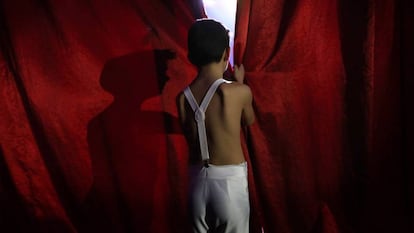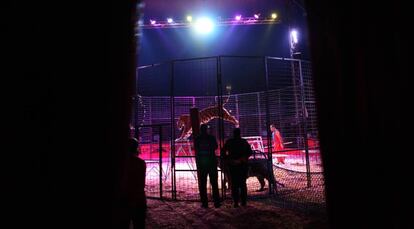An old-fashioned circus with bite
An afternoon at Gottani, one of just nine spectacles in Spain that still makes use of performing animals
Elena, 15, is waiting behind the heavy red curtain for Denny Gottani, the director of the Gottani Circus, to call her into the stage to begin her acrobatics act 'The Moon'. She leaves the cold face with which it supports the 11 degrees of the winter night in Vallecas to present itself with a smile in the center of the tent. Around 150 people are watching her from stands that can hold an audience of 1,000. Wreathed in smoke, she starts her routine while Don't Stop The Music by Rihanna blasts from the speakers, drowning out the noise of the ducks and geese waiting their turn in the wings.

The Gottani big top will be pitched on waste ground in Madrid's working class Vallecas district, until February 26. It has all the trappings of a traditional circus: behind the scenes, the smell of wet sawdust mixes with the whiff of popcorn; stunning metallic blue feathers are kept in a trash can, the fur of black horses emanates dust when the animals shakes they heads and artists warm up before going on stage next to the goats. The Gottani Circus is one of only nine in Spain that still works with wild animals. It has six elephants, two tigers, a lion, a llama, two goats and several dogs.
At 4 o'clock on a recent wet Friday, three hours before the show, the big top is empty. The action is elsewhere, inside the dozens of caravans parked behind the blue-and-yellow marquee. Fifty people from 12 different families work side by side during the three-month season. Denny Gottani, whose family has been in the business for five generations, is something of a nomad. “Ever since I was born, my home has been wherever the circus is performing. I am from Italy, France, Morocco, Spain and anywhere else,” he says.
As show time approaches, the performers start to emerge from their trailers and the music is turned on in the big top
His family is the only one in the Gottani Circus that remains throughout the changing seasons. This year, for example, the other artists are Russian, Argentinean, Portuguese and Italian.
Lorela, Denny’s daughter, is 13. She lives in Toledo, where she goes to school, but she comes to the big top every day. She has been training with horses, her favorite animal, since she was eight. “I tell my friends that living in a circus is really fun and that they are missing out,” she says. Hours before the show, Lorela cleans out the sweets trolley and helps the other young people to get things ready. But whether she’s cleaning or performing, she always wears her circus jacket and a generous helping of fuchsia and green eye-shadow.
This Friday, because of the rain, the animals are inside their cages or, in the case of the six elephants, sheltering in their own tent. Jay Gartner, 42, is the elephant trainer. The walls of his caravan, which is parked next to ‘his’ elephants, are plastered with photos and newspaper cuttings telling the story of his life.
“All trainers sleep next to their animals,” he says, sporting a pin emblazoned with Yes to the animal circus! “I go to see them before I have a cup of coffee in the morning. Later, I let them have a walk and give them something to eat and, when it's their turn, I wash them. We don't rehearse – they are 40 years old. What else am I going to teach them?”

Sergio Gottani, 72, who is a tiger and rhinoceros trainer, explains: “People who don't want to see animals don't go to the circus. But those who come are always asking us what kind of animals we have.”
As show time approaches, the performers start to emerge from their trailers and the music is turned on in the big top. A man dressed in a tracksuit with a clown nose comes out of his caravan to chide some children who are jumping on a trampoline without their coats on. The oldest child is nine and wants to be a tiger tamer, while his eight-year-old friend wants to train elephants. A five-year-old girl playing with them harbors ambitions to be a clown and a teacher.
The show is delayed by 10 minutes as the public continues to pour into the big top. “Friday is not a busy day,” says Denny. “Saturdays usually bring in a crowd of around 800 and Christmas is sold out.”
Having checked on the elephants and their trainer, made sure the supports of the big top are secure and instructed his daughter on her act, Denny Gottani now puts on his military-style jacket with its gold brocade and takes on the role of ringmaster. As if by magic, his voice is transformed as he delivers the phrase he has heard for the last 38 years: “Let the show begin!”
Denny Gottani, the same one that hours before checked the elephants next to the tamer, then hammered the btackets of the tent and later gave instructions to his daughter, now receives honorable in a black suit and a military-style with silver seams. As if by magic, his voice is transformed into that of a circus catalog host, and with courage and dedication, says the phrase that resonates in his head for the last 38 years: “Let the show begin!”.
People are always asking us what kind of animals we have
Sergio Gottani
English version by Alyssa McMurtry.
Tu suscripción se está usando en otro dispositivo
¿Quieres añadir otro usuario a tu suscripción?
Si continúas leyendo en este dispositivo, no se podrá leer en el otro.
FlechaTu suscripción se está usando en otro dispositivo y solo puedes acceder a EL PAÍS desde un dispositivo a la vez.
Si quieres compartir tu cuenta, cambia tu suscripción a la modalidad Premium, así podrás añadir otro usuario. Cada uno accederá con su propia cuenta de email, lo que os permitirá personalizar vuestra experiencia en EL PAÍS.
¿Tienes una suscripción de empresa? Accede aquí para contratar más cuentas.
En el caso de no saber quién está usando tu cuenta, te recomendamos cambiar tu contraseña aquí.
Si decides continuar compartiendo tu cuenta, este mensaje se mostrará en tu dispositivo y en el de la otra persona que está usando tu cuenta de forma indefinida, afectando a tu experiencia de lectura. Puedes consultar aquí los términos y condiciones de la suscripción digital.









































